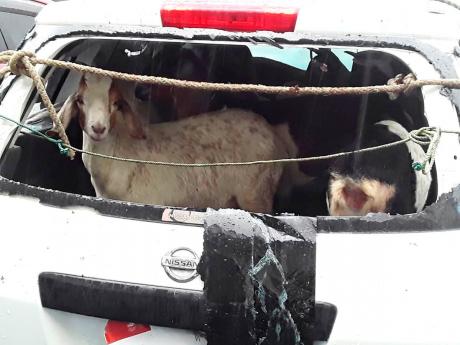Deadly danger for farmers
Some ready to exit agriculture as at least 12 colleagues meet bloody end in 2021
After losing an estimated $6 billion in produce and animals to thieves annually with little or no redress, and having seen at least 12 of their colleagues murdered this year alone, many of the island’s farmers are now awaiting the maturity of their current crops to end their love affair with what has become a nightmare.
The farmers are frustrated that the police have not been able to do more to help them protect their lives and livelihoods, noting that although sometimes the crooks are caught, the majority still escape the long arm of the law.
The problem has also moved beyond simple larceny, as the police acknowledged, moving into the realm of organised crime with an illicit meat-for-guns trade between thugs in Jamaica and their criminal counterparts in Haiti.
Jamaica Agricultural Society (JAS) President Lenworth Fulton noted that after the quick intervention of the police led to the recovery of some goats stolen from a St Catherine farmer recently, gunfire after the return of the animals left many farmers traumatised.
And even before last week’s murder of two goat farmers in Westmoreland, many had decided to throw in the towel before their crops have matured with others are parting with their livestock in a hurry. Several of those who remain in the sector have decided to sleeping in the belly of their farms with community support, ready to defend their livelihoods with their machetes and firearms should the robbers strike.
APPEALING TO FARMERS
“We at the JAS have been begging farmers not to take justice in their own hands. They have been telling us all the time that they were going to chop up and mutilate anyone who they catch stealing their crops or animals,” Fulton told The Sunday Gleaner.
“The frustration comes because reporting praedial larceny to the police and getting them to take action is a low-hanging fruit. The same police who investigate murders, shootings and rape are the same ones who investigate praedial larceny. And, it gets left [behind],” he continued, noting that other crimes considered more serious usually result in the cops putting farm theft probes on the back burner.
“A lot of chop-up take place that is not reported. They (farmers) don’t really kill them (thieves) – for they are not killers – but they chop them up. The thieves can’t report it and the farmers not reporting it either. It happens all the time. Every minister from Horace Clarke come right down knows about the farmers’ frustration,” Fulton added, referencing a now-deceased former minister who took over the agriculture portfolio in the Cabinet following the People’s National Party’s electoral victory in 1989.
Fulton, whose JAS has some 250,000 registered farmers among its ranks, said that there is a need for immediate compensation to farmers when someone is convicted of stealing their crops or livestock.
Currently, they are only compensated for losses caused by natural disasters through the Production Incentive Programme.
“The thieves are not stealing pigs so often because they are too difficult to manage, but if the police did not find the goats for that St Catherine farmer, he would probably get in debt to restart,” Fulton said.
There are also difficulties when a matter gets to court, as Fulton said that the onus is on farmers to prove that the stolen goods belonged to them.
Recalling an incident during his years as a banana farmer, he said that a man caught on his farm with 19 bunches of the fruit but was freed in court as the judge had requested proof that those exact bananas came from his farm. He needed to make an exact match between the stems left on the trees to each bunch.
CALL FOR AMENDMENTS
“It’s reasons like these why farmers prefer to chop up persons rather than report to police. A lot of thieves steal people animals and get away because they are charged under the Praedial Larceny Act,” he said, lamenting that for the last 15 years, there have been calls for amendments to the Agricultural Produce Act.
“The penalties issued for acts of praedial larceny are drawn from several pieces of legislation as the Agricultural Produce and the Praedial Larceny Acts do not outline penalties for theft,” acknowledges a 2014 ministry paper. “Resident magistrates are forced to pull on legislations such as the Larceny Act, Unlawful Possession of Property Act and several others to apply punitive measures to perpetrators. There is need to bolster the legislative framework in an effort to provide greater penalties as a strong deterrent to this practice by making it a felony under the law. There is also the need to redefine ‘praedial larceny’ to include livestock, fisheries, lumber and other classes of agricultural produce.”
Agriculture Minister Audley Shaw last week expressed regret to the families of the murdered small ruminant farmers, identified as 76-year-old Henry Jones and 42-year-old Bryan Chambers. He also condemned the gun attack on the homes of the Spanish Town farmers, but cautioned the farmers not to take matters in their own hands.
He said that some 41 arrests were made between January to October 2021, but that is little comfort to Newton Powell, a 79-year-old St Ann farmer, who has been robbed more times than he can count.
“The criminals don’t care. They steal from you any time, day or night. And many times the people stealing from you are the people who work for you and set up their friends to steal your crops. Sometimes they do things to get themselves fired just before your crops mature and then they line up their friends and make off with your crops,” the elderly man said.
His son, who currently lives overseas, had plans to take over the farm on his return to the island.
“After all that is going on now, I don’t want him to become involved. It is not safe for me. It is not safe for him – all because we have a set of people who do not want to work but only want to steal,” Powell told The Sunday Gleaner last week.
Superintendent Oral Pascoe, who heads the Praedial Larceny Prevention Unit – a collaboration between the ministries of Agriculture and Fisheries and National Security – said that approximately 1,000 cases are currently before the courts, adding that there is a 50 per cent conviction rate.
On the job since November, he wants farmers to become more involved.
“I have been pushing for farmers to become organised through a farmers’ watch. It’s similar to how the neighbourhood watch group functions, but on WhatsApp. This is to ensure there are more eyes watching each other’s backs and farms, and which has the capacity to mobilise individuals quickly,” he told The Sunday Gleaner.
OPERATIONAL ACROSS EIGHT PARISHES
Praedial larceny units are operational in eight police divisions across eight parishes. Some units have designated vehicles, while others depend on the general fleet.
“People don’t understand the economic value of farming to families. ... When you rob somebody, you are depriving a child of having his exam fees being paid. It is really hard. For every plate of goat meat you eat, you should really ask if this is someone’s stolen goat,” Pascoe said.
He will be going on a parish tour in early 2022 to put structures on farmers community groups, he said, adding that farmers deemed fit and proper and want to apply for firearms should be supported.
Opposition Spokesman on Agriculture Lothian Cousins also called for farmers to be allowed to bear legal arms.
“It is clear that the State is not equipped to deal with this issue alone, so the only option to save the sector and provide hope for the farmers is to ensure that those who are fit and proper persons who have been screened and declared fit to bear arms, should be encouraged to apply for firearms and their applications should be fast-tracked at the Firearm Licensing Authority,” he told The Sunday Gleaner.
He also believes exemptions and waivers should also be provided for farmers purchasing equipment intended to be used to beef up security on their farms.
In the long term, he said, the Government should increase its investment in the Praedial Larceny Unit by providing more vehicles to patrol remote areas and strengthen border security to cripple the meat-for-guns trade.
Former Agriculture Minister Floyd Green outlined some of the actions taken and planned during his one-year stint which ended in September.
“One of the things we were able to do is to re-establish praedial larceny units across seven police divisions. They were the divisions most affected so we sought to strengthen the capacity of those units. It helped because we had increased arrests, but the police have to redouble their efforts to restore confidence in the farmers,” he told The Sunday Gleaner.
“It has taken a much more sinister turn where they are not only losing crops and livestock but their lives. Those involved in praedial larceny are much more organised and they are stealing animals to trade with neighbours for guns, so the stakes are much higher,” Green noted.
CHANGES TO LEGISLATION
He noted that changes have also been made to the anti-gang legislation to include praedial larceny as one of the crimes for which gangsters can be hauled before the courts.
“Gang members who set out to steal animals as part of their modus operandi can be charged under that legislation, where fines and penalties are stiffer,” Green said.
The inability to trace the origin of meats makes trading in stolen property lucrative, Green acknowledged, adding that it was high on the ministry’s agenda for changes to be made to the Agricultural Produce Act and other pieces of legislation that deal with praedial larceny. The act is under review by the Law Reform Division of the Ministry of Justice and a draft Cabinet submission has been prepared for comment.
J.C. Hutchinson , the former minister without portfolio in the Ministry of Industry, Commerce, Agriculture and Fisheries, who preceded Green at the helm, noted that every stolen animal or produce ends up on someone’s plate.
“There has to be a way to ensure that the person who sells us the meat can say to a police officer, if questioned, where he bought it from. Your supplier cannot be someone who can’t account for what he is selling you,” Hutchinson said.
Among the recommendation for amendments to the act was for immediate restitution to the farmers, in addition to the court fines as high as $3 million or imprisonment, noting that a number of farmers, especially those in remote areas, have expressed fears to continue in the sector.
He added that the situation was so serious that electronic monitoring of convicts should be considered as many are repeat offenders, moving across parish borders.


